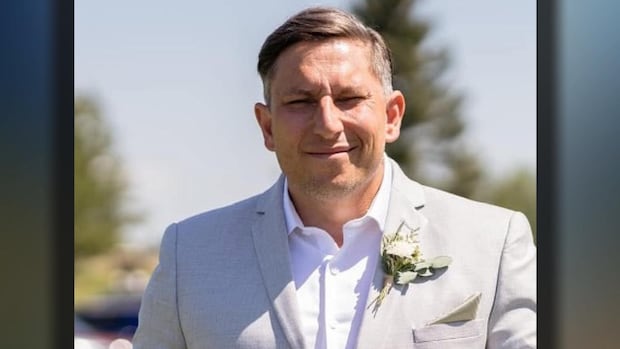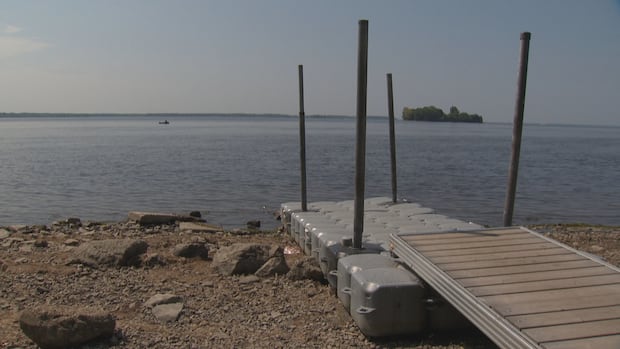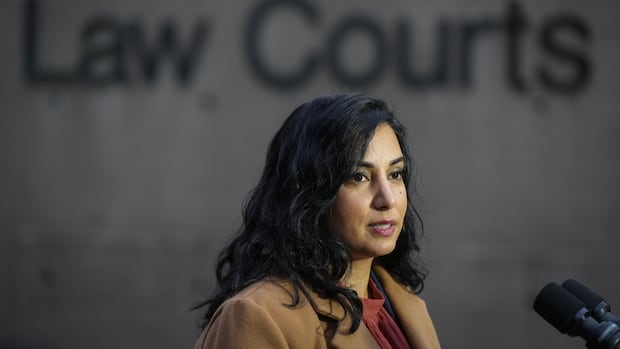Delores Kakegamic says she’s tired of losing children to house fires in her community.
The chief of Sandy Lake says the First Nation is mourning the loss of an 11-year-old child to a house fire that occurred Thursday afternoon.
“Our firefighters have no gear. If they had gear, they would have been able to go further into the house, but with all the smoke, they could only go a couple of seconds at a time,” Kakegamic said.
The house belonged to the community’s fire marshal, she said. A fire shield in the home gave them enough time to get the rest of the children out. Many of the occupants were treated at the nursing station for smoke inhalation.
Sandy Lake First Nation is an Oji-Cree community located in Treaty 5, about 600 kilometres northwest of Thunder Bay, Ont. Kakegamic says about 3,500 people live there.
There are two fire trucks in the First Nation but only one is functional, she said.
Our firefighters have no gear. If they had gear, they would have been able to go further into the house, but with all the smoke, they could only go a couple of seconds at a time.– Delores Kakegamic, Chief of Sandy Lake First Nation
The Nishnawbe Aski Police Service (NAPS) told CBC News in an email that nine occupants escaped the fire, which was reported shortly after 5 p.m. on Thursday.
“When officers arrived on scene, community fire suppression efforts were already ongoing. A scene is being held and members of the NAPS Northwest Crime Unit are now involved in the ongoing investigation,” NAPS spokesperson Scott Paradis said Friday morning.
The community is still grieving the death of a kindergarten student in a house fire in late February, Kakegamic said.
In January 2022, three children — ages four, six and nine — also died in a house fire in Sandy Lake.
In the fall, Sandy Lake filed a lawsuit against the federal government, alongside Oneida Nation of the Thames, over Canada’s funding of fire services in First Nations.
“We can say what we want, but it never arrives,” Kakegamic said of the resources she’s been asking for.
CBC News has reached out to Indigenous Services Canada for a response about Thursday’s fire in Sandy Lake First Nation and is awaiting a response.
Fire prevention, planning
People who live in First Nations are about 10 times more likely to die in a house fire than those living in other communities in the country, according to Statistics Canada.
Arnold Lazare, who lives in Kahnawà:ke, Que., is the interim CEO of the National Indigenous Fire Safety Council. While the cause of Thursday’s fire in Sandy Lake is unknown at this time, he said most fire-related deaths in remote communities can be attributed to a lack of smoke detectors, a shortage of firefighting services and overcrowded, inadequate housing.
“You end up getting a perfect storm where you have multiple people, multiple families in an underrated home without a smoke detector,” he said.
While much of his work involves getting smoke detectors delivered to communities, he said, the most important thing is fire prevention education.
For example, Lazare said people often take down smoke detectors when they’re cooking and don’t put them back.
“There needs to be a public education process where the family is made aware of what to do, primarily the children and the elders who are the most vulnerable,” Lazare said.
He encourages all households to create a fire safety plan, so all members know where to locate emergency exits and have a meet-up spot outside in case a fire occurs.
“We know that by continuing on this path, we are going to reduce the number of fire-related deaths,” he said.
‘The firefighters are traumatized’
At the time of Thursday’s fire, Kakegamic said about half of Sandy Lake’s firefighters were participating in training outside the community.
In addition to better equipment, she said she wants to see more mental health support for those keeping the community safe.
“The firefighters are traumatized,” she said. “They’re left to deal with it on their own and they’re having a tough time.”
With a new federal government in power — and the first Indigenous MP to hold the position of Minister of Indigenous Services — Lazare said he feels hopeful that federal funding can be better allocated to meet First Nations’ needs.
Providing resources at the community level is key, he said.
“Part of our plan is to advocate not for an increase in funding, because we realize funding is short, but what we’re advocating for is a more effective use of the dollars that are there,” he said. “It empowers the community.”
Mental health counselling and crisis support is available 24 hours a day, seven days a week through the Hope for Wellness hotline at 1-855-242-3310 or by online chat at www.hopeforwellness.ca.






